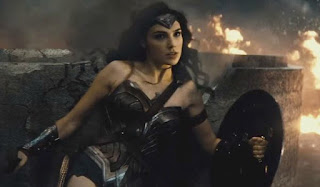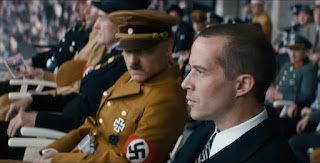Now that the reviews of Batman v
Superman are out, and it has been pretty much broadly agreed that the movie
does not live up to the gigantic hype generated by the title – hard core DC
fans might disagree – let’s look at something slightly more complex, something
about the way the two of our superheroes have been projected by Zack Snyder and
team.
Why is Batman angry with
Superman, why does he want Superman finished? Yes, we are shown right at the start
why Bruce Wayne doesn’t view Superman very favourably. We can understand anyone
feeling a bit antagonized when they or their dear ones are caught in the
collateral damage of a big fight. So he
nurses that angst for nearly 2 years before he gets a sniff at a chance of
going up against Superman without a certainty of death.
The first hour or so of the movie
tries to reinforce again and again as to why the Batman is so angry
with the
Superman. He says that ‘even if there is a 1% possibility that this guy can
become our enemy, we have to take it as an absolute certainty’. That is a logic
that is hard to accept because even that 1% possibility has not substantial
evidence, and the Bat of Gotham works on evidence and data rather than gut
instincts and hunches. Actually, this version of the Batman shows him as
someone far more practical and more evidence-based vigilante than previous
versions. Look for example the amount of data he tries to gather about Lex
Luthor before launching any action at all. Phone call data, encrypted disks, a
Kryptonite consignment –the Bat waits for the jigsaw to fall into place before
he swings into action. Yet, when it comes to Superman, the Batman needs one act
of collateral damage to decide that he
has to be counted as an enemy. That does not convey the image of an
impassionate and objective superhero, this is a superhero who lets his heart
get in the way.
We all know that the Batman,
whichever version it is, has bad childhood memories that haunt him time and
again. In fact, it is those childhood memories that haunt him and drive him
towards becoming a vigilante. But, never once have we seen the Batman act on
the behest of those childhood memories and insecurities. He always does what is
right. But in Batman v Superman, the motive behind his angst towards Superman
seems to be driven a lot by his insecurities. We have dream sequences where the
Superman unmasks the Batman after having him captured, we have another dream
where people asking him to save them from Superman. It is almost as if the
deep-seated mental insecurities of Bruce Wayne dictate the targets of the
Batman. That is not the sign of a true superhero, that is the sign of a
fallible, feeble mind, which is not how we want to see the Batman. The
overwhelming feeling I got while watching Batman v Superman is that the Batman
was actually jealous of the Superman, jealous of the fact that a more powerful,
more omnipresent superhero had taken over from him. It was like Batman shared
the insecurities of many ordinary people around him, the insecurity that comes
in the presence of someone overwhelmingly powerful. That makes Batman just
another person like you and me, which is not how anyone wants to see him.
You might ask, isn’t it the same
thing that the movie does with Superman? He too assumes Batman as
a nuisance
vigilante just because some newspapers say so. Right, but Superman is much
different from Batman. Superman is a reactive superhero, he has always been a
reactive superhero. He is the guy who wears his cape when he sees something bad
happening on TV and flies to the scene of action and blasts every bad guy with
sheer power. We do not expect any great calculative moves from Superman, he
just reacts! But, Batman is not so! He analyses, he makes plans and he chooses
his adversaries. He doesn’t let situations dictate his actions, he is always
one step ahead of the bad guys. Batman is a proactive superhero, and it is this
aspect of Batman that was completely messed up in Zack Snyder’s film. He made
perfect plans for Superman without analysing whether he was really an enemy,
and he analysed Lex Luthor a lot without having any plans for him. That is just
not like Batman and we hope DC sets it right in movies to come.





















